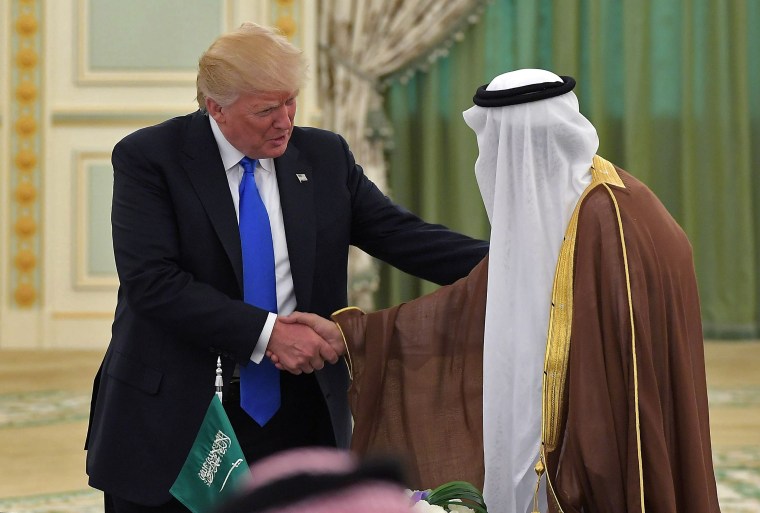In August 2017, in response to economic sanctions approved by the U.S. Congress, Vladimir Putin's Russian government announced it was expelling 755 people from the American embassy and consulate staff. As regular readers may recall, it was a striking diplomatic move, and an escalation of tensions between the two countries, which seemed to warrant a stern White House response.
Asked for his response, Donald Trump expressed his gratitude. "I want to thank [Putin], because we're trying to cut down on payroll," the Republican said. "And as far as I'm concerned, I'm very thankful."
Substantively, this was effectively gibberish, but it was also a bizarre diplomatic posture: American presidents are not supposed to "thank" foreign governments after incidents in which they act against the United States.
This came to mind this morning, as Trump publicly thanked Saudi Arabia. The Associated Press reported:
President Donald Trump publicly thanked Saudi Arabia for plunging oil prices just a day after he was harshly criticized for deciding not to further punish the kingdom for the killing of U.S.-based columnist Jamal Khashoggi.Trump, who made clear in an exclamation-filled statement on Tuesday that he feels that the benefits of good relations with the kingdom outweigh the possibility its crown prince ordered the killing, tweeted on Wednesday that it's "Great!" that oil prices are falling."Thank you to Saudi Arabia, but let's go lower!" he wrote from his Mar-a-Lago club in Palm Beach, Florida, where he's spending Thanksgiving.
This largely echoed a point Trump included in his hopelessly bizarre written statement yesterday, in which he wrote in reference to Saudi officials, "They have worked closely with us and have been very responsive to my requests to keeping oil prices at reasonable levels -- so important for the world."
In a Q&A with reporters soon after, the American president added that Saudi Arabia has helped me do one thing very importantly -- keep oil prices down."
So to recap, Donald Trump was told by his own intelligence professionals that Saudi Arabia murdered an American journalist and lied to him about it. Soon after, Trump decided to ignore his own country's intelligence assessment. A day later, he publicly thanked Saudi Arabia for modest gas prices.
It's a tough posture to defend. In fact, the Republican's assumption -- Saudis aren't charging more for gas as some kind of favor worthy of his personal gratitude -- is itself an amoral mess.
Some observers have concluded over the last 24 hours that we're now coming to terms with the scope of Trump's "American First" agenda: he'll overlook just about anything, including murder, if it means protecting American jobs and American consumers' interests. Principles and moral standards are nice, the argument goes, but this president will gladly sacrifice them to keep our unemployment rate and prices at the pump low.
The problem with the observation is that it's not altogether based on reality. For example, the American jobs Trump insists will result from his deals with Riyadh are a mirage. The president's claims are based on a ridiculous fiction that he continues to peddle, reality be damned.
What's more, as the Washington Post's Greg Sargent explained this morning, it's far too generous to argue that Trump is so committed to Americans' interests that he'll even excuse the execution of an American journalist.
"In this case and many others, Trump is not being 'frank' about his real priorities, and he is not putting America first," Greg explained. "He's putting his own naked self-interest over what's good for America, and prioritizing the real-world policy realization of his own prejudices over any good-faith, fact-based effort to determine, by any discernible standard, what might actually be in the country's interests."
